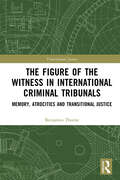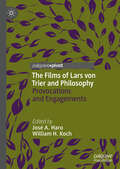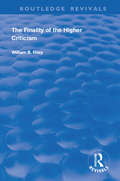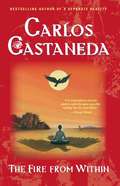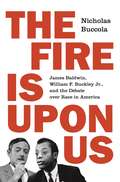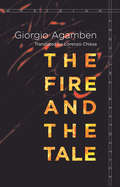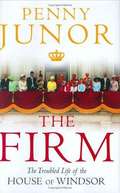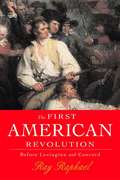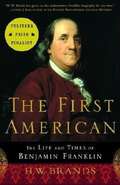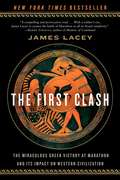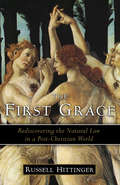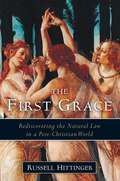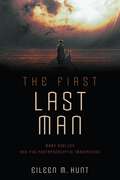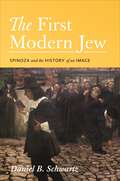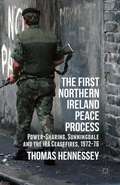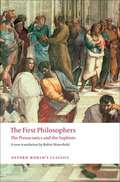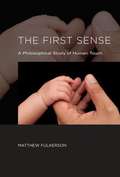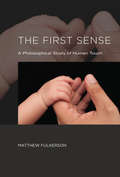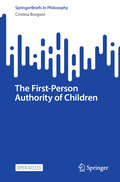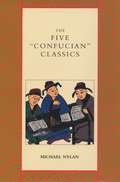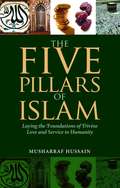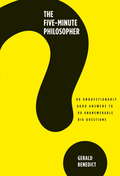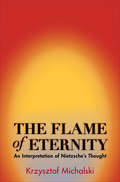- Table View
- List View
The Figure of the Witness in International Criminal Tribunals: Memory, Atrocities and Transitional Justice
by Benjamin ThorneThis book analyses how international criminal institutions, and their actors – legal counsels, judges, investigators, registrars – construct witness identity and memory. Filling an important gap within transitional justice scholarship, this conceptually led and empirically grounded interdisciplinary study takes the International Criminal Tribunal for Rwanda (ICTR) as a case study. It asks: How do legal witnesses of human rights violations contribute to memory production in transitional post-conflict societies? Witnessing at tribunals entails individuals externalising memories of violations. This is commonly construed within the transitional justice legal scholarship as an opportunity for individuals to ensure their memories are entered into an historical record. Yet this predominant understanding of witness testimony fails to comprehend the nature of memory. Memory construction entails fragments of individual and collective memories within a contestable and contingent framing of the past. Accordingly, the book challenges the claim that international criminal courts and tribunals are able to produce a collective memory of atrocities; as it maintains that witnessing must be understood as a contingent and multi-layered discursive process. Contributing to the specific analysis of witnessing and memory, but also to the broader field of transitional justice, this book will appeal to scholars and practitioners in these areas, as well as others in legal theory, global criminology, memory studies, international relations, and international human rights.
The Films of Lars von Trier and Philosophy: Provocations and Engagements
by José A. Haro William H. KochThe films of Lars von Trier offer unique opportunities for thinking deeply about how Philosophy and Cinema speak to one another. The book addresses von Trier’s films in order of their release. The earlier chapters discuss his Golden Heart trilogy and USA: Land of Opportunities series by addressing issues of potential misogyny, ethical critique, and racial justice. The later chapters focus on his Depression Trilogy and address the undermining of gender binaries, the psychoanalytic meaning of the sacrifice of children and depression, and philosophical questions provoked by the depiction of the end of the world. Taken together, the volume explores the topics of Philosophical Psychology, Social Theory, Political Theory, Theories of the Self, Philosophy of Race, and Feminist Thought, and opens a conversation about von Trier’s important work.
The Finality of the Higher Criticism: Or, The Theory of Evolultion and False Theology (Routledge Revivals)
by W. B. RileyFirst published in 1988, this volume was originally published, according to the authors, thanks to a ‘conscious call’. They were ‘fully persuaded that the honor of Christ and the very life of His church are alike endangered by the doubting spirit now brooding over the educational institutions of America.’ The book contains chapters on the prominence of scepticism in schools; the theory of evolution and false theology; and the sacred scriptures.
The Fire From Within
by Carlos CastanedaFire from Within is the author's most brilliant thought-provoking and unusual book, one in which Castaneda, under the tutelage of don Juan and his "disciples," at last constructs, from the teachings of don Juan and his own experiences, a stunning portrait of the "sorcerer's world" that is crystal-clear and dizzying in its implications. Each of Carlos Castaneda's books is a brilliant and tantalizing burst of illumination into the depths of our deepest mysteries, like a sudden flash of light, like a burst of lightning over the desert at night, which shows us a world that is both alien and totally familiar -- the landscape of our dreams.
The Fire Is upon Us: James Baldwin, William F. Buckley Jr., and the Debate over Race in America
by Nicholas BuccolaHow the clash between the civil rights firebrand and the father of modern conservatism continues to illuminate America's racial divideOn February 18, 1965, an overflowing crowd packed the Cambridge Union in Cambridge, England, to witness a historic televised debate between James Baldwin, the leading literary voice of the civil rights movement, and William F. Buckley Jr., a fierce critic of the movement and America's most influential conservative intellectual. The topic was "the American dream is at the expense of the American Negro," and no one who has seen the debate can soon forget it. Nicholas Buccola's The Fire Is upon Us is the first book to tell the full story of the event, the radically different paths that led Baldwin and Buckley to it, the controversies that followed, and how the debate and the decades-long clash between the men continues to illuminate America's racial divide today.Born in New York City only fifteen months apart, the Harlem-raised Baldwin and the privileged Buckley could not have been more different, but they both rose to the height of American intellectual life during the civil rights movement. By the time they met in Cambridge, Buckley was determined to sound the alarm about a man he considered an "eloquent menace." For his part, Baldwin viewed Buckley as a deluded reactionary whose popularity revealed the sickness of the American soul. The stage was set for an epic confrontation that pitted Baldwin's call for a moral revolution in race relations against Buckley's unabashed elitism and implicit commitment to white supremacy.A remarkable story of race and the American dream, The Fire Is upon Us reveals the deep roots and lasting legacy of a conflict that continues to haunt our politics.
The Fire and the Tale
by Giorgio Agamben Lorenzo ChiesaWhat is at stake in literature? Can we identify the fire that our stories have lost, but that they strive, at all costs, to rediscover? And what is the philosopher's stone that writers, with the passion of alchemists, struggle to forge in their word furnaces? For Giorgio Agamben, who suggests that the parable is the secret model of all narrative, every act of creation tenaciously resists creation, thereby giving each work its strength and grace. The ten essays brought together here cover works by figures ranging from Aristotle to Paul Klee and illustrate what urgently drives Agamben's current research. As is often the case with his writings, their especial focus is the mystery of literature, of reading and writing, and of language as a laboratory for conceiving an ethico-political perspective that places us beyond sovereign power.
The Firm: The Troubled Life of the House of Windsor
by Penny JunorHowever you look at it, the royal family is a big business, though one with more ups and downs than the stock market. Prince Philip calls it "The Firm," and all the royal executives and their powerful associates are supposed to make every effort to avoid even a hint of scandal that could diminish the reputation of the family business.
The First American Revolution: Before Lexington and Concord
by Ray RaphaelThe famous Shot Heard Round the World in April 1775 was not the beginning of the armed struggle for independence, says popular historian Raphael. The British were at that point trying to regain the authority that thousands of artisans and farmers had seized from every Crown-appointed official in Massachusetts outside Boston the previous summer. Annotation c. Book News, Inc. , Portland, OR (booknews. com)
The First American: The Life and Times of Benjamin Franklin
by H. W. BrandsPULITZER PRIZE FINALIST • Benjamin Franklin, perhaps the pivotal figure in colonial and revolutionary America, comes vividly to life in this &“thorough biography of ... America&’s first Renaissance man&” (The Washington Post) by the two-time Pulitzer Prize finalist, bestselling historian, and author of Our First Civil War."The authoritative Franklin biography for our time.&” —Joseph J. Ellis, author of the Pulitzer Prize-winning Founding BrothersWit, diplomat, scientist, philosopher, businessman, inventor, and bon vivant, Benjamin Franklin's "life is one every American should know well, and it has not been told better than by Mr. Brands" (The Dallas Morning News). From penniless runaway to highly successful printer, from ardently loyal subject of Britain to architect of an alliance with France that ensured America&’s independence, Franklin went from obscurity to become one of the world&’s most admired figures, whose circle included the likes of Voltaire, Hume, Burke, and Kant.Drawing on previously unpublished letters and a host of other sources, acclaimed historian H. W. Brands has written a thoroughly engaging biography of the eighteenth-century genius. A much needed reminder of Franklin&’s greatness and humanity, The First American is a work of meticulous scholarship that provides a magnificent tour of a legendary historical figure, a vital era in American life, and the countless arenas in which the protean Franklin left his legacy.Look for H.W. Brands's other biographies: ANDREW JACKSON, THE MAN WHO SAVED THE UNION (Ulysses S. Grant), TRAITOR TO HIS CLASS (Franklin Roosevelt) and REAGAN.
The First Breath
by Icarus Phaethon"Everyone's life is a mountain. You can spend your whole time wandering around the lowlands and foothills of this great peak, but unless you make the commitment to get to the top one day, you will never find out who you really are." The First Breath is an astounding work that is a mix of travel narrative, philosophical dialogue, human drama, intrigue, love story and soul-searching personal journey. It will challenge your perception of the world and relationship with it. There's something terribly wrong with the world, at least Icarus thinks so. Something's not quite right and it's something he can't quite put his finger on. It's akin to that fleeting moment when you think of a rose then you actually see one, and can't quite figure out whether it's just a coincidence or something much stranger, deeper and far reaching than you could ever imagine.
The First Clash: The Miraculous Greek Victory at Marathon--and Its Impact on Western Civilization
by Jim LaceyMarathon--one of history's most pivotal battles. Its very name evokes images of almost superhuman courage, endurance, and fighting spirit. But until now, the story of what happened at Marathon has been told exclusively through the narrow viewpoint of specialists in antiquity. In this eye-opening new book, acclaimed journalist Jim Lacey, both a military historian and a combat veteran, takes a fresh look at Marathon and reveals why the battle happened, how it was fought, and whether, in fact, it saved Western civilization. Lacey brilliantly reconstructs the world of the fifth century B.C. leading up to the astonishing military defeat of the Persian Empire by the vastly undermanned but determined Greek defenders. Using the seminal work of Herodotus as his starting point, Lacey reconstructs the tactical and strategic scenario of the battle, including how many combatants each side might have used and who actually led the Greeks. He also disputes the long-repeated myths of Athenian inexperience and effete Persian arrogance. With the kind of vivid detail that characterizes the best modern war reportage, Lacey shows how the heavily armed Persian army was shocked, demoralized, and ultimately defeated by the relentless assault of the Athenian phalanx, which battered the Persian line in a series of brutal attacks. He reveals the fascinating aftermath of Marathon, how its fighters became the equivalent of our "Greatest Generation," and challenges the view of many historians that Marathon ultimately proved the Greek "Western way of war" to be the superior strategy for fighting--and winning--battles to the present day. Immediate, visceral, and full of new analyses that defy decades of conventional wisdom, The First Clash is a superb interpretation of a conflict that indeed made the world safe for Aristotle, Plato, and our own modern democracy. But it was also a battle whose legacy and lessons have often been misunderstood--perhaps, now more than ever, at our own peril.
The First French Reformation
by Tyler LangeThe political culture of absolute monarchy that structured French society into the eighteenth century is generally believed to have emerged late in the sixteenth century. This new interpretation of the origins of French absolutism, however, connects the fifteenth-century conciliar reform movement in the Catholic Church to the practice of absolutism by demonstrating that the monarchy appropriated political models derived from canon law. Tyler Lange reveals how the reform of the Church offered a crucial motive and pretext for a definitive shift in the practice and conception of monarchy, and explains how this First French Reformation enabled Francis I and subsequent monarchs to use the Gallican Church as a useful deposit of funds and judicial power. In so doing, the book identifies the theoretical origins of later absolutism and the structural reasons for the failure of French Protestantism.
The First Grace: Rediscovering the Natural Law in a Post-Christian World
by Russell HittingerIn the book’s first section, Hittinger defines the natural law, considers its proper relationship to moral theology and the positive law, and explains how and when judges should be guided by natural law considerations. Then, in the book’s second section, he contends with a number of controversial legal and cultural issues from a natural law perspective. Among other things, he shows how the modern propensity to make all sorts of “rights claims” undermines the idea of limited government; how the liberal legal culture’s idea of privacy elevates the individual to the status of a sovereign; and how the Supreme Court has come to cast religion as a dangerous phenomenon from which children must be protected.Whether discussing the nature of liberalism, the constitutional and moral problems posed by judicial usurpation, or the dangers of technology, Hittinger convincingly demonstrates that in our post-Christian world it is more crucial than ever that we recover older, wiser notions of the concepts of freedom and law—since to oppose them is to misunderstand both profoundly.
The First Grace: Rediscovering the Natural Law in a Post-Christian World
by Russell HittingerThe last two decades or so have seen a marked resurgence of interest in natural law thought, a movement in which Russell Hittinger has been a major figure. The First Grace: Rediscovering the Natural Law in a Post-Christian World reveals the power and subtlety of Hittinger's philosophical work and cultural criticism. Whether discussing the nature of liberalism, the constitutional and moral problems posed by judicial usurpation, or the dangers of technology, Hittinger convincingly demonstrates that in our post-Christian world it is more crucial than ever that we recover older, wiser notions of the concepts of freedom and law - and that we see that to place these two concepts in opposition is to misunderstand both profoundly.
The First Last Man: Mary Shelley and the Postapocalyptic Imagination
by Eileen M. HuntBeyond her most famous creation—the nightmarish vision of Frankenstein’s Creature—Mary Shelley’s most enduring influence on politics, literature, and art perhaps stems from the legacy of her lesser-known novel about the near-extinction of the human species through war, disease, and corruption. This novel, The Last Man (1826), gives us the iconic image of a heroic survivor who narrates the history of an apocalyptic disaster in order to save humanity—if not as a species, then at least as the practice of compassion or humaneness. In visual and musical arts from 1826 to the present, this postapocalyptic figure has transmogrified from the “last man” into the globally familiar filmic images of the “invisible man” and the “final girl.”Reading Shelley’s work against the background of epidemic literature and political thought from ancient Greece to Covid-19, Eileen M. Hunt reveals how Shelley’s postapocalyptic imagination has shaped science fiction and dystopian writing from H. G. Wells, M. P. Shiel, and George Orwell to Octavia Butler, Margaret Atwood, and Emily St. John Mandel. Through archival research into Shelley’s personal journals and other writings, Hunt unearths Shelley’s ruminations on her own personal experiences of loss, including the death of young children in her family to disease and the drowning of her husband, Percy Bysshe Shelley. Shelley’s grief drove her to intensive study of Greek tragedy, through which she developed the thinking about plague, conflict, and collective responsibility that later emerges in her fiction. From her readings of classic works of plague literature to her own translation of Sophocles’s Oedipus Rex, and from her authorship of the first major modern pandemic novel to her continued influence on contemporary popular culture, Shelley gave rise to a tradition of postapocalyptic thought that asks a question that the Covid-19 pandemic has made newly urgent for many: What do humans do after disaster?
The First Modern Jew: Spinoza and the History of an Image
by Daniel B. SchwartzPioneering biblical critic, theorist of democracy, and legendary conflater of God and nature, Jewish philosopher Baruch Spinoza (1632-1677) was excommunicated by the Sephardic Jews of Amsterdam in 1656 for his "horrible heresies" and "monstrous deeds." Yet, over the past three centuries, Spinoza's rupture with traditional Jewish beliefs and practices has elevated him to a prominent place in genealogies of Jewish modernity. The First Modern Jew provides a riveting look at how Spinoza went from being one of Judaism's most notorious outcasts to one of its most celebrated, if still highly controversial, cultural icons, and a powerful and protean symbol of the first modern secular Jew. Ranging from Amsterdam to Palestine and back again to Europe, the book chronicles Spinoza's posthumous odyssey from marginalized heretic to hero, the exemplar of a whole host of Jewish identities, including cosmopolitan, nationalist, reformist, and rejectionist. Daniel Schwartz shows that in fashioning Spinoza into "the first modern Jew," generations of Jewish intellectuals--German liberals, East European maskilim, secular Zionists, and Yiddishists--have projected their own dilemmas of identity onto him, reshaping the Amsterdam thinker in their own image. The many afterlives of Spinoza are a kind of looking glass into the struggles of Jewish writers over where to draw the boundaries of Jewishness and whether a secular Jewish identity is indeed possible. Cumulatively, these afterlives offer a kaleidoscopic view of modern Jewish cultureand a vivid history of an obsession with Spinoza that continues to this day.
The First Northern Ireland Peace Process: Power-Sharing, Sunningdale and the IRA Ceasefires 1972-76
by Thomas HennesseyThe First Northern Ireland Peace Process covers the various attempts to end the 'Troubles' from 1972-76. These attempts included secret talks with the Provisional IRA and a parallel process to build a political consensus between the British and Irish Governments and the main constitutional parties in Northern Ireland.
The First Philosophers: The Presocratics and Sophists (Oxford World's Classics)
by Robin WaterfieldAristotle said that philosophy begins with wonder, and the first Western philosophers developed theories of the world which express simultaneously their sense of wonder and their intuition that the world should be comprehensible. But their enterprise was by no means limited to this proto-scientific task. Through, for instance, Heraclitus' enigmatic sayings, the poetry of Parmenides and Empedocles, and Zeno's paradoxes, the Western world was introduced to metaphysics, rationalist theology, ethics, and logic, by thinkers who often seem to be mystics or shamans as much as philosophers or scientists in the modern mould. And out of the Sophists' reflections on human beings and their place in the world arose and interest in language, and in political, moral, and social philosophy. This volume contains a translation of all the most important fragments of the Presocratics and Sophists, and of the most informative testimonia from ancient sources, supplemented by lucid commentary. About the Series: For over 100 years Oxford World's Classics has made available the broadest spectrum of literature from around the globe. Each affordable volume reflects Oxford's commitment to scholarship, providing the most accurate text plus a wealth of other valuable features, including expert introductions by leading authorities, voluminous notes to clarify the text, up-to-date bibliographies for further study, and much more.
The First Sense
by Matthew FulkersonIt is through touch that we are able to interact directly with the world; it is our primary conduit of both pleasure and pain. Touch may be our most immediate and powerful sense -- "the first sense" because of the central role it plays in experience. In this book, Matthew Fulkerson proposes that human touch, despite its functional diversity, is a single, unified sensory modality. Fulkerson offers a philosophical account of touch, reflecting the interests, methods, and approach that define contemporary philosophy; but his argument is informed throughout by the insights and constraints of empirical work on touch. Human touch is a multidimensional object of investigation, Fulkerson writes, best served by using a variety of methods and approaches. To defend his view of the unity of touch, Fulkerson describes and argues for a novel, unifying role for exploratory action in touch. He goes on to fill in the details of this unified, exploratory form of perception, offering philosophical accounts of tool use and distal touch, the representational structure of tangible properties, the spatial content of touch, and the role of pleasure in tactual experience. Fulkerson's argument for the unique role played by exploratory action departs notably from traditional vision-centric philosophical approaches to perception, challenging the received view that action plays the same role in all sensory modalities. The robust philosophical account of touch he offers in The First Sense has significant implications for our general understanding of perception and perceptual experience.
The First Sense: A Philosophical Study of Human Touch (The\mit Press Ser.)
by Matthew FulkersonAn empirically informed philosophical account of human touch as a single, unified sensory modality that plays a central role in perception. It is through touch that we are able to interact directly with the world; it is our primary conduit of both pleasure and pain. Touch may be our most immediate and powerful sense—“the first sense” because of the central role it plays in experience. In this book, Matthew Fulkerson proposes that human touch, despite its functional diversity, is a single, unified sensory modality. Fulkerson offers a philosophical account of touch, reflecting the interests, methods, and approach that define contemporary philosophy; but his argument is informed throughout by the insights and constraints of empirical work on touch. Human touch is a multidimensional object of investigation, Fulkerson writes, best served by using a variety of methods and approaches.To defend his view of the unity of touch, Fulkerson describes and argues for a novel, unifying role for exploratory action in touch. He goes on to fill in the details of this unified, exploratory form of perception, offering philosophical accounts of tool use and distal touch, the representational structure of tangible properties, the spatial content of touch, and the role of pleasure in tactual experience. Fulkerson's argument for the unique role played by exploratory action departs notably from traditional vision-centric philosophical approaches to perception, challenging the received view that action plays the same role in all sensory modalities. The robust philosophical account of touch he offers in The First Sense has significant implications for our general understanding of perception and perceptual experience.
The First-Person Authority of Children (SpringerBriefs in Philosophy)
by Cristina BorgoniThis is an open access book that addresses how we treat others and, in particular, infants and children, with first-person authority. We respond to people’s first-person authority when we give our interlocutor’s communication of their mental states more significance in establishing their thoughts, desires, and feelings than if another person were to report those mental states for them. But what happens when our interlocutors are infants and children? Increasingly, practices of responsive childrearing ascribe first-person authority to very young children. Despite this tendency, philosophy seems to be one step behind. The accepted view is one in which first-person authority has its locus in linguistic expressions of one’s self-knowledge. This is an over-intellectualized conception, however, that consequently tends to exclude children. By combining philosophical resources with empirical findings about the onset of human communication, play, and our nature as social beings, this text advances a non-intellectualized, anti-individualist, and non-adult-centered view of first-person authority. This is a view that both accommodates our daily experiences and provides material for advancing the philosophical debate around the phenomenon in an enriched and more inclusive way.
The Five "Confucian" Classics
by Michael NylanMichael Nylan describes how the ancient text has influenced East Asia.
The Five Pillars of Islam
by Musharraf HussainThe Five Pillars of Islam is a comprehensive and practical manual on the fundamental beliefs and practices of a Muslim and provides an understanding of the true spirit of worship in Islam. Written by a noted Muslim scholar and educationist with a contemporary Muslim audience in mind, this is an invaluable reference for every home and classroom.Musharraf Hussain, PhD, is the director of the Karimia Institute in the United Kingdom. In 2009 he was awarded the Order of the British Empire for his services to community relations in Britain.
The Five-Minute Philosopher
by Gerald BenedictWise and down-to-earth answers to 80 of the eternal questions that we are likely to ponder, in our more thoughtful moments, on our life's journey - from 'Is there a God?' to 'Is a human being just another animal?'
The Flame of Eternity: An Interpretation of Nietzsche's Thought
by Krzysztof MichalskiThe Flame of Eternity provides a reexamination and new interpretation of Nietzsche's philosophy and the central role that the concepts of eternity and time, as he understood them, played in it. According to Krzysztof Michalski, Nietzsche's reflections on human life are inextricably linked to time, which in turn cannot be conceived of without eternity. Eternity is a measure of time, but also, Michalski argues, something Nietzsche viewed first and foremost as a physiological concept having to do with the body. The body ages and decays, involving us in a confrontation with our eventual death. It is in relation to this brute fact that we come to understand eternity and the finitude of time. Nietzsche argues that humanity has long regarded the impermanence of our life as an illness in need of curing. It is this "pathology" that Nietzsche called nihilism. Arguing that this insight lies at the core of Nietzsche's philosophy as a whole, Michalski seeks to explain and reinterpret Nietzsche's thought in light of it. Michalski maintains that many of Nietzsche's main ideas--including his views on love, morality (beyond good and evil), the will to power, overcoming, the suprahuman (or the overman, as it is infamously referred to), the Death of God, and the myth of the eternal return--take on new meaning and significance when viewed through the prism of eternity.
